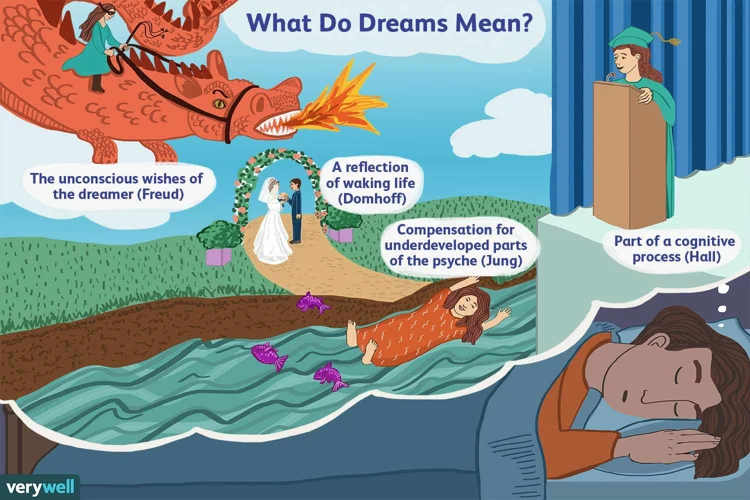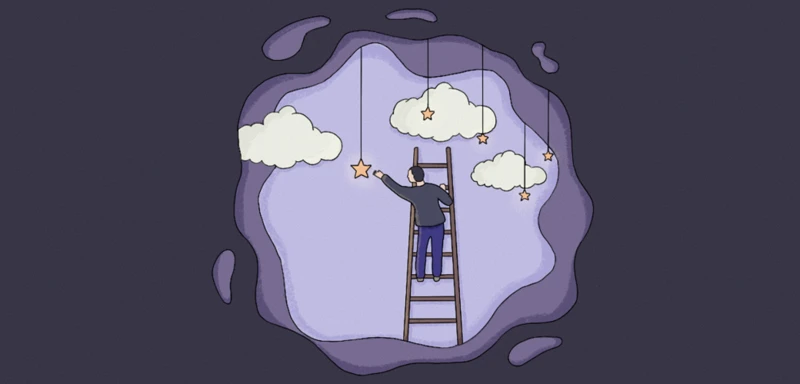Have you ever wondered about the significance of falling in dreams? Dreaming is a mysterious and fascinating experience that has captivated humans for centuries. Our dreams often contain symbols and imagery that can provide insight into our subconscious mind. Falling dreams, in particular, hold unique symbolism and interpretation. They can represent various aspects of our lives, such as fear of failure, loss of control, the need for change, and even insecurity. In this article, we will delve into the psychology of dreaming, explore the meaning behind falling dreams, discuss common interpretations, and offer guidance on overcoming fear and embracing change. So, grab a cup of tea, sit back, and prepare to unravel the mysteries of falling dreams.
The Psychology of Dreaming

Dreams have long fascinated psychologists and researchers, as they provide a window into our subconscious mind. The psychology of dreaming is a complex and enigmatic field, where experts seek to understand the purpose and significance of these nocturnal experiences. One theory proposes that dreaming serves as a means of processing emotions and memories, allowing our brains to make sense of the events and stresses of daily life. Dreams can be influenced by our waking experiences, fears, desires, and unresolved conflicts. By analyzing dream symbolism and patterns, psychologists aim to gain insight into the inner workings of the mind. The study of dreams opens up a vast array of possibilities for self-discovery and personal growth. If you are interested in exploring the meanings behind other dream experiences, such as being chased or running, be sure to check out our articles “Exploring the Meaning of Being Chased in Dreams” and “Interpreting Running Dreams.”
1.1 Understanding Dreams
Understanding dreams is a fundamental aspect of exploring the significance of falling in dreams. Dreams are a product of the subconscious mind and can provide valuable insights into our thoughts, emotions, and experiences. To better comprehend dreams and their meanings, it is important to consider the following:
1. The Unconscious Mind: Dreams are believed to originate from the unconscious part of our minds. The unconscious mind encompasses our deepest desires, fears, and unresolved conflicts. It is a reservoir of thoughts and emotions that may not always be accessible to our conscious awareness. When we sleep, the unconscious mind becomes more active, allowing it to express itself through dreams.
2. Symbolism: Dreams often communicate through symbols and imagery. Symbolic representations in dreams can vary depending on cultural, personal, and archetypal associations. Interpreting these symbols requires careful analysis and consideration. For example, dreaming of dancing can symbolize joy, freedom, or even the celebration of life. To explore the meanings behind dancing dreams, check out our article on “Interpreting Dancing Dreams.”
3. Emotional Significance: Dreams often evoke strong emotions within us. The emotions experienced during dreams can provide clues about our innermost feelings and concerns. Paying attention to the emotions felt during a falling dream can help in understanding its deeper significance. Is there fear, anxiety, excitement, or a sense of liberation associated with the fall?
4. Personal Associations: Dreams are highly personal and can be influenced by our individual experiences, memories, and relationships. Analyzing the context and personal associations within a dream can lead to a more profound understanding of its meaning. Reflecting on the events and people present in the dream, as well as any personal connections, can offer valuable insights.
By understanding the nature of dreams, their symbolism, emotional significance, and personal associations, we can begin to unravel the meaning behind falling dreams. Explore the depths of your unconscious mind and discover the rich tapestry of symbolism that lies within.
1.2 The Significance of Dream Symbols
Dream symbols play a crucial role in understanding the deeper meaning of our dreams. These symbols can range from specific objects or animals to more abstract concepts and emotions. The significance of dream symbols lies in their ability to provide insight into our unconscious thoughts and feelings.
1. Symbols as Representations: Dream symbols often represent something beyond their literal interpretation. For example, a dream about a snake may symbolize fear or transformation, rather than just the physical presence of a snake. Similarly, dreaming about a house could represent one’s sense of self or personal identity.
2. Personal and Universal Symbols: Some dream symbols are deeply personal and unique to the dreamer’s individual experiences and psyche. These symbols can be influenced by personal memories, traumas, desires, and cultural background. On the other hand, there are also universal symbols that hold meaning across cultures and societies, such as water representing emotions or birds symbolizing freedom.
3. Context and Interpretation: Understanding dream symbols requires considering the context in which they appear. The same symbol can have different meanings depending on the dreamer’s personal experiences and emotional state. For example, dreaming about falling may signify a fear of failure for one person and a desire for change for another. Dream analysis involves examining the overall narrative and emotional atmosphere of the dream to decipher the symbols’ significance.
4. Evolving Symbols: It’s important to note that dream symbols can evolve and change over time. A symbol that held a particular meaning in one dream may have a different interpretation in another dream. Keeping a dream journal and regularly reflecting on dreams can help identify recurring symbols and their evolving significance.
Understanding the significance of dream symbols is a valuable tool for introspection and self-discovery. It allows individuals to tap into their unconscious mind and gain insights into their emotions, desires, and fears. However, it’s important to remember that dream interpretation is subjective and there are no definitive rules for deciphering dream symbols. The interpretation of symbols ultimately depends on the dreamer’s personal experiences and associations.
Interpreting Falling Dreams

Falling dreams can hold profound symbolism and offer valuable insights into our subconscious mind. Interpreting falling dreams requires a deep understanding of the possible meanings behind this common dream theme. One interpretation suggests that falling represents a fear of failure. It may symbolize the anxiety and uncertainty that we experience when facing challenges or taking risks in our waking lives. Another interpretation is that falling represents a loss of control. It can reflect feelings of powerlessness or a lack of agency in certain situations. Additionally, falling dreams can be seen as a symbol of change. They may indicate the need to let go of old patterns or embrace new opportunities. Lastly, falling dreams can reflect underlying insecurities and a fear of vulnerability. By exploring the unique symbolism within these dreams, we can gain a better understanding of ourselves and our subconscious desires.
2.1 Falling as a Fear of Failure
Falling in dreams can often represent a deep-seated fear of failure. When we fall, it can symbolize a loss of control and an inability to maintain stability or success in our waking lives. The sensation of falling can evoke feelings of anxiety, vulnerability, and a fear of not living up to expectations. This dream scenario may be particularly common for individuals who are ambitious, have high-achieving goals, or are facing important decisions or challenges in their lives. The fear of failure manifests in the dream world as a literal fall, reminding us of the consequences and potential disappointments that come with not reaching our goals. These dreams serve as a subconscious reminder to address our fears, take calculated risks, and embrace the possibility of failure as a stepping stone towards growth and success. It is important to remember that dreams about falling do not necessarily predict failure, but rather, they offer an opportunity for self-reflection and exploration.
2.2 Falling as a Loss of Control
Falling as a Loss of Control
Falling dreams often symbolize a loss of control in our waking lives. When we experience feelings of helplessness or uncertainty, it can manifest in our dreams as falling. This type of dream may occur when we are facing challenges or situations that are beyond our control, leaving us feeling powerless. The sensation of falling can be accompanied by a sense of panic or fear, mirroring the emotions we may experience when we are unable to exert influence over a particular outcome. It is essential to pay attention to the context of the dream and the specific circumstances surrounding it. Is there a particular area of your life where you feel overwhelmed or lacking control? Reflecting on these aspects can provide valuable insights into the underlying feelings and anxieties that may be contributing to the loss of control theme in your dreams. By acknowledging these emotions, you can begin to explore avenues for regaining control in your waking life, whether through setting boundaries, seeking support, or taking proactive steps towards achieving your goals. Remember, dreams are a reflection of our inner thoughts and emotions, and by unraveling their meanings, we can take steps to regain our sense of control and empowerment.
2.3 Falling as a Symbol of Change
Falling dreams can also be seen as a symbol of change . Just as we fall from a secure position to an unknown destination in our dreams, it reflects the transformative journey we may be undergoing in our waking lives. This type of dream often occurs during periods of transition, such as starting a new job, moving to a different city, or entering a new phase of life. It signifies that we are stepping outside of our comfort zones and venturing into uncharted territory. While the sensation of falling in the dream may evoke feelings of fear or uncertainty, it also represents the potential for growth and personal development. Like a caterpillar transforming into a butterfly, falling dreams serve as a reminder that change can be both challenging and rewarding. Embracing the symbolism of falling can empower us to embrace change, let go of the past, and embrace new opportunities that come our way.
2.4 Falling as a Reflection of Insecurity
Falling in dreams can also serve as a reflection of insecurity. When we feel insecure in our waking life, it can manifest in our dreams as a sensation of falling. This could be a representation of our fear of not being able to meet expectations or feeling inadequate in certain areas of our lives. It may stem from a lack of confidence or self-esteem. The act of falling can symbolize a perceived lack of control or stability, mirroring our insecurities about navigating life’s challenges. It’s important to recognize that dreams often exaggerate reality, so the depth of the fall in our dreams may not directly correlate to the extent of our insecurities. However, these dreams can provide valuable insights into our emotional state and highlight areas where we need to work on building self-assurance. By addressing and overcoming our insecurities, we can cultivate a sense of empowerment and regain control of our lives.
Common Interpretations

When it comes to falling dreams, there are several common interpretations that can help shed light on their meaning. Common interpretations of falling dreams include scenarios where an individual is falling from a great height, falling into darkness, falling and landing softly, falling and waking up, and falling with others. Falling from a great height often symbolizes the fear of failure or the pressure of high expectations. Falling into darkness can represent a sense of uncertainty or being overwhelmed by negative emotions. Falling and landing softly may suggest a potential for resilience and the ability to bounce back from setbacks. Falling and waking up can symbolize a desire for change or a need to wake up to a new reality. Falling with others might signify a shared experience or feeling supported during challenging times. Exploring these interpretations can provide valuable insights into the subconscious mind and help individuals navigate their emotions and experiences.
3.1 Falling from a Great Height
One common interpretation of falling dreams is when the individual experiences a sensation of falling from a great height. This particular scenario in a dream often signifies a feeling of being out of control or overwhelmed by a situation in your waking life. It may represent a fear of failure or a lack of confidence in your abilities to navigate challenging circumstances. The intensity of the fall can reflect the magnitude of your perceived obstacles or challenges. The dream may be telling you that you are taking on too much or that you need to reassess your goals and priorities. It is essential to examine the emotions and thoughts that arise during the dream and analyze how they relate to your waking life. Are there any specific situations or areas of your life where you feel like you’re free-falling? This interpretation can serve as a wake-up call to evaluate your current circumstances and seek ways to regain a sense of control and balance. Remember, even if you feel like you’re falling, there are always opportunities to regain stability and overcome obstacles in life.
3.2 Falling into Darkness
Falling into darkness is a common theme in dreams that holds profound symbolism and meaning. When we dream of falling into darkness, it often represents a sense of uncertainty, fear, or a feeling of being lost. This darkness can symbolize the unknown or aspects of ourselves that we have yet to explore or understand. It may signify a period of transition or a challenging situation in our waking life where we feel overwhelmed or out of control. Falling into darkness can also signify a deep emotional or psychological struggle, where we are grappling with our own shadows and unresolved issues. It is essential to pay attention to the emotions and sensations experienced during this type of dream, as they can provide valuable insights into our innermost fears and anxieties. It is important to remember that darkness in dreams does not necessarily imply something negative. It can also represent the fertile void from which new beginnings and transformations emerge. By acknowledging and confronting the darkness within us, we can embark on a journey of self-discovery and growth. Embracing the unknown can lead to profound personal and spiritual development. So, if you find yourself falling into darkness in your dreams, take it as an opportunity to delve into the depths of your being and find the light that awaits within.
3.3 Falling and Landing Softly
When it comes to falling dreams, one common scenario is falling and landing softly. This dream experience often carries a positive connotation and can be interpreted as a symbol of resilience and adaptability. Falling and landing softly suggests that even in the face of adversity or unexpected challenges, you have the ability to navigate through them with grace and ease. It signifies your ability to bounce back from difficult situations and land on your feet. This dream may reflect your optimistic outlook and the belief that you can overcome obstacles in your waking life. It is a reminder that you possess the strength and resilience to handle whatever comes your way. So, if you find yourself dreaming of falling and landing softly, take it as a reassuring message from your subconscious mind that you have the capabilities to handle any setbacks or challenges that may arise. Embrace your resilience and use it as a driving force to propel yourself forward in your journey towards personal growth and success.
3.4 Falling and Waking Up
Falling and waking up from a dream is a common occurrence that can leave us feeling disoriented and unsettled. When we experience the sensation of falling in a dream and suddenly awaken, it can be a jarring experience. This type of dream is often associated with a sudden jolt or jerking motion upon waking, known as a hypnic jerk. The sensation of falling followed by waking up can be interpreted in a few different ways. One interpretation is that this dream reflects a sense of instability or insecurity in our waking lives. It may suggest that we are going through a period of uncertainty or facing challenges that make us feel like we are constantly on the verge of losing control. Alternatively, falling and waking up can also symbolize a transition or change that is happening in our lives. It may mean that we are letting go of old habits or ways of thinking, and embarking on a new chapter. This type of dream can be seen as an opportunity for growth and transformation. It is important to pay attention to the emotions and sensations experienced during these dreams as they can provide valuable insights into our subconscious mind. Whether it evokes fear, excitement, or curiosity, falling and waking up dreams can serve as wake-up calls to examine our lives and make necessary adjustments.
3.5 Falling with Others
Falling with others in dreams can add another layer of symbolism and complexity to the experience. This dream scenario often signifies the presence of interpersonal relationships and the influence of others in our lives. When we dream of falling with others, it may indicate a sense of unity or shared vulnerability. It could mean that we are going through a challenging or uncertain time together with someone else or a group of people. This shared experience of falling can represent a collective fear, struggle, or journey that we are undertaking alongside others. It is essential to consider the identities and roles of the individuals falling with us in the dream. Are they close friends, family members, or acquaintances? The nature of our relationship with these individuals may provide further insight into the dream’s meaning. It’s also worth exploring how we feel during the shared falling experience. Are we supporting each other, comforting one another, or feeling helpless together? These emotions can offer clues about the dynamics of our relationships and how we navigate difficulties as a unit. Reflecting on falling with others in dreams can help us gain a deeper understanding of our connections and the impact they have on our lives.
To summarize, falling with others in dreams signifies a sense of unity, shared vulnerability, and collective experience. Analyzing the identities, roles, and emotions surrounding these individuals can provide valuable insights into our interpersonal relationships and how we navigate challenges together.
Overcoming Fear and Embracing Change
Embracing change can be a daunting task for many individuals, as it often involves stepping out of one’s comfort zone and facing the unknown. Falling dreams, with their symbolic representation of change and insecurity, can serve as a catalyst for personal growth and transformation. Here are some strategies to help overcome fear and embrace change:
- Recognize and acknowledge the fear: The first step in overcoming fear is to acknowledge its presence. By recognizing that fear is a natural response to change, we can begin to understand and address it.
- Challenge negative beliefs: Fear often stems from negative beliefs and assumptions about ourselves and the world around us. Take a moment to challenge these beliefs and replace them with more positive and empowering thoughts.
- Take small steps: Change doesn’t have to happen all at once. Start by taking small, manageable steps towards your desired goals. This gradual approach helps build confidence and reduces the fear associated with big leaps.
- Seek support: Surround yourself with a supportive network of friends, family, or mentors who can provide guidance and encouragement throughout your journey of change. Their perspective and wisdom can help ease anxieties and provide a sense of reassurance.
- Practice self-care: Taking care of yourself, both physically and mentally, is essential when embracing change. Engage in activities that promote relaxation, such as meditation or yoga, and prioritize self-care practices that nourish your well-being.
- Embrace a growth mindset: Adopting a growth mindset allows you to see challenges as opportunities for learning and personal development. This shift in perspective can help reframe fear as excitement and fuel your motivation to embrace change.
Remember, change is a natural part of life, and falling dreams can serve as a reminder that growth and transformation often come hand in hand with moments of uncertainty. By applying these strategies and embracing change with an open heart and mind, you can navigate through fear and unlock the possibilities that lie ahead.
Conclusion
In conclusion, falling dreams hold great significance in the realm of symbolism and interpretation. They can represent a fear of failure, a loss of control, the need for change, or feelings of insecurity. By delving into the psychology of dreaming, we gain a deeper understanding of the subconscious mind and how it manifests in our dreams. Interpreting falling dreams can provide valuable insights into our fears, desires, and unresolved emotions. It is important to remember that dream interpretation is subjective and can vary from person to person. Therefore, it is crucial to explore your own personal associations and emotions connected to falling in dreams. Whether you find yourself falling from great heights, into darkness, or landing softly, each interpretation offers its own unique message. Embracing the symbolism of falling dreams can help us overcome our fears, embrace change, and navigate our lives with a newfound sense of empowerment. So, the next time you find yourself falling in a dream, remember to explore the deeper meanings and use them as stepping stones towards personal growth and self-discovery.
Frequently Asked Questions
1. Can falling dreams predict the future?
Falling dreams do not have the ability to predict the future. They are symbolic representations of our emotions and subconscious thoughts rather than prophetic visions.
2. Are falling dreams always negative?
While falling dreams can often be associated with negative emotions, they are not always negative. The context and feelings experienced during the dream can provide clues to the interpretation and whether it carries a positive or negative meaning.
3. Why do some people have recurring falling dreams?
Recurring falling dreams may indicate that the dreamer is grappling with a persistent issue or fear in their waking life. It could represent an unresolved problem that keeps resurfacing in their subconscious mind.
4. Can falling dreams be related to physical sensations during sleep?
Yes, falling dreams can sometimes be accompanied by physical sensations, such as a quick jerking motion or the feeling of weightlessness. These sensations are known as hypnic jerks and often occur during the transition from wakefulness to sleep.
5. Are falling dreams more common in certain age groups?
Falling dreams can occur at any age, but research suggests that they may be more prevalent in younger individuals. This could be attributed to the significant life changes and uncertainties often experienced during adolescence and early adulthood.
6. Can falling dreams help us understand our fears?
Yes, falling dreams can provide valuable insight into our fears and anxieties. By analyzing the specific details and emotions associated with the dream, we can gain a deeper understanding of the underlying issues that may be causing these fears.
7. Do falling dreams have cultural significance?
Yes, falling dreams can hold cultural significance in certain societies. For example, in some Indigenous cultures, falling dreams may be seen as a spiritual journey or a sign of personal growth and transformation.
8. Can falling dreams be influenced by external factors?
Absolutely. Falling dreams can be influenced by various external factors, such as stress, trauma, medication, or even the consumption of certain foods before bedtime. These factors can shape the content and intensity of our dreams.
9. Are falling dreams the same for everyone?
No, falling dreams can vary greatly from person to person. The interpretation of falling dreams depends on the individual’s personal experiences, emotions, and unique subconscious mind. What may symbolize fear for one person could represent exhilaration or freedom for another.
10. Can falling dreams be controlled or manipulated?
With practice, some individuals may be able to gain a degree of control over their dreams through techniques like lucid dreaming. However, manipulating falling dreams specifically may require a deeper understanding of dream symbolism and advanced dream control skills.








